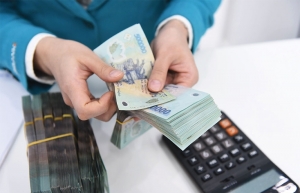Budget estimate shortcomings require modern fix
The government last week reported that under its latest calculations, the state budget revenue last year hit about VND1.815 quadrillion ($78.93 billion), which is VND201.4 trillion ($8.75 billion) or 12.5 per cent higher than a previously reported figure.
“The revenue has sufficiently met all tasks on expenditures for development investment, social security, salary reform, and other necessary tasks,” the government stated.
 |
| Budget estimate shortcomings require modern fix |
Such a revenue increase was thanks to a rise in many items, with enterprises performing relatively well despite massive difficulties. For example, the economy’s most updated export turnover last year reached $371.3 billion, higher than the $368 billion earlier reported to the National Assembly – with the exact trade surplus of more than $12.4 billion, far higher than the only $1 billion earlier reported to the legislative body.
However, the National Assembly Economic Committee (NAEC) found that the government’s formulation of state budget revenue estimates has failed to exactly reflect the reality of such revenue performance.
According to an NAEC report on appraising the government report on Vietnam’s state budget situation in 2022 and in the first four months of this year, the aforementioned state budget revenue figures are 28.6 per cent higher than initial estimates.
“This mirrors the fact that estimates were too low, narrowing down the fiscal space and badly affecting the state budget revenue estimates for the next year. This is a shortcoming that has failed to be overcome for many years,” the NAEC stressed.
It is recommended that the government draw experience and must have a proper solution to overcome this issue and improve the quality of formulation in state budget revenue estimates of every year, the committee continued.
In addition, many localities made low revenue estimates but they have been assigned to collect higher revenues. Some 43 provinces and cities nationwide set up revenue estimates higher than the assigned figures from the government.
“The formulation of localities’ budget revenue estimates has failed to be close to their ability in collecting revenue, and this [negative] situation has become common. It is suggested that the government soon have solutions to overcome this situation in order that the formulation of state budget revenue in the coming year will be close to the reality,” said NAEC Chairman Vu Hong Thanh.
According to the latest figures from the Ministry of Finance (MoF), in this year’s first four months, the state budget revenue is estimated to have touched VND632.5 trillion ($27.5 billion), tantamount to 39 per cent of the year’s estimates – with the policy of extending the time for payment of taxes and land rental since mid-April. This is also equal to 93.1 per cent of that in the same period of last year.
However, the four-month domestic revenue equals 39.5 per cent of estimates and 95.8 per cent of that in the corresponding period last year. Tending to decrease as compared to the initial estimates, this type of revenue reached 16.1 per cent in January, 7.1 per cent in February, 8.6 per cent in March, and 7.6 per cent in April.
In addition, revenues from crude oil exports stood at $952.17 million, down 9.6 per cent on-year. Revenues from export-import activities are estimated at $3.68 billion – down 19.9 per cent on-year.
“Business, production, and investment activities are facing difficulties coupled with a reduction in trade, which will likely hurt state budget revenues in Q2 and the entire year, pressuring fiscal policy monitoring,” stated Minister of Planning and Investment Nguyen Chi Dung.
According to the World Bank, difficulties in domestic production and trade are expected to cause a reduction in state budget revenues in the coming months. “Vietnam faces heightened risks associated with external headwinds and domestic vulnerabilities. Persistent inflationary pressures and the prospects of more aggressive monetary tightening could induce volatility in global financial markets,” it said.
Under an MoF report on Vietnam’s budget situation estimates for 2023, the state budget revenue structure will embrace $58 billion from domestic revenues – far lower than $61.8 billion recorded last year; $1.83 billion from crude oil exports if about eight million tonnes are exploited domestically and an average price stays at around $70 per barrel; $239.1 million from foreign assistance; and $10.39 billion from export and import activities – much lower than $12.17 billion last year.
Meanwhile, it is estimated that Vietnam’s total state budget expenditure this year will be about $90.26 billion – up 16.3 per cent as compared to the expenditure estimations of 2022.
 | Budget resolutions set plan for 2023 Vietnam’s state budget performance is expected to see a deficit of billions of US dollars this year, with such a landscape fixed for next year – with warnings sounded about punishing violations in budget management and usage. |
 | Measures to boost trade underpins cautious stance Despite a positive budget landscape last year, the government has mapped out a cautious projection for 2023 with a large deficit due to massive difficulties expected ahead. |
What the stars mean:
★ Poor ★ ★ Promising ★★★ Good ★★★★ Very good ★★★★★ Exceptional
 Tag:
Tag:
Related Contents
Latest News
More News
- Banking sector targets double-digit growth (February 23, 2026 | 09:00)
- Private capital funds as cornerstone of IFC plans (February 20, 2026 | 14:38)
- Priorities for building credibility and momentum within Vietnamese IFCs (February 20, 2026 | 14:29)
- How Hong Kong can bridge critical financial centre gaps (February 20, 2026 | 14:22)
- All global experiences useful for Vietnam’s international financial hub (February 20, 2026 | 14:16)
- Raised ties reaffirm strategic trust (February 20, 2026 | 14:06)
- Sustained growth can translate into income gains (February 19, 2026 | 18:55)
- The vision to maintain a stable monetary policy (February 19, 2026 | 08:50)
- Banking sector faces data governance hurdles in AI transition (February 19, 2026 | 08:00)
- AI leading to shift in banking roles (February 18, 2026 | 19:54)






















 Mobile Version
Mobile Version